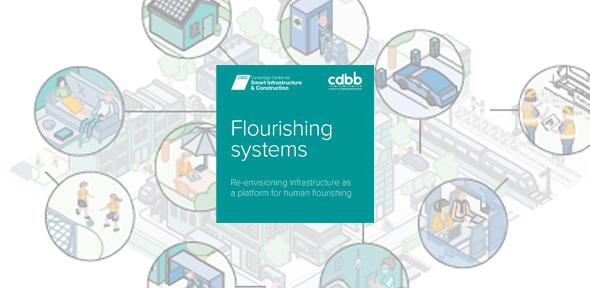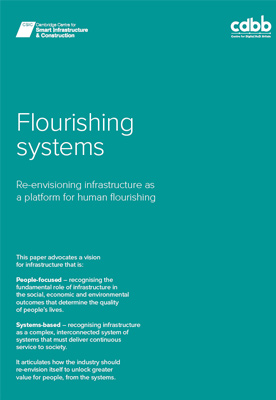
Submitted by Angela Walters on Thu, 14/05/2020 - 14:22
On May 12th, the Institution of Engineering and Technology (IET) webinar launch of Flourishing Systems invited more than 100 industry representatives to heed the call to change the way we view and run our national infrastructure in the urgent context of socio-economic recovery from Covid-19 and challenges of climate change.
A panel of contributors each gave their opinion as to why the paper’s simple but radical proposition –that the purpose of infrastructure is for humanity to flourish and that infrastructure is a system of systems which we must envision and manage accordingly – is both compelling and pressing.
Explaining the purpose of the paper as “re-envisioning infrastructure as a platform for human flourishing”, Mark Enzer, Chief Technical Officer at Mott MacDonald and Head of the National Digital Twin Programme at the Centre for Digital Built Britainsaid: “We are familiar with infrastructure because we all use it, but tend to think about it as a series of construction projects rather than the complex machine we have built to effectively make our lives better – and to do this infrastructure needs to be seen as a platform for human flourishing.”
Highlighting some of the high-level themes of the paper, including people, connections, sustainability, and digitalisation, Enzer emphasised the need to see the interconnections of our infrastructure systems to recognise it as a system of systems. “This system of systems needs to last as long as we need our society to be sustained – making the whole issue of sustainability key.”
Dr Jennifer Schooling OBE, Director of the Cambridge Centre for Smart Infrastructure and Constructionspoke of the need to reframe infrastructure to reflect its complex nature. “Our infrastructure is a system of interconnected systems that has been assembled and operated over the past 200 years. It is vital to the health and wellbeing of society and the economy and, as such, it must continue to be sustained.” Highlighting the imperative of climate change challenges and the importance of valuing existing assets to optimise value, Dr Schooling said: “The value of the infrastructure we already have around us is immense and we must be good custodians of this complex web of existing assets. We pay a lot of attention to new projects and capital expenditure but valuing and maintaining our existing assets, shifting to a whole-life system view of the economics, is essential to our infrastructure continuing to support human flourishing.”
The role of data in shaping services that support better outcomes for society is key to success: “There are a number of important tools we have to help us and the most important is data and the analytics used to understand and turn data into information. Technology provides a fantastic tool but does not solve problems without us looking at the social outcomes.”
Welcoming the report that “widens the view of infrastructure as a system of systems which is an important step to show the value of infrastructure”, Neil Thompson, Director of Digital at Atkins and Member of the IET Built Environment Panelsaid: “The wellbeing of people and the environment is important and the convergence of the network in a systems view will enable us to deal with challenges more effectively and collaborate in delivering desired outcomes from a human and environmental perspective.”
Considering the timeliness of the paper’s focus on and discussion of systems of systems in the context of Covid-19, Prof Jennifer Whyte, Director of the Centre for Systems Engineering and Innovationsaid: “There has certainly been a systems shock but this type of disruption, used in the right way, can be quite generative providing opportunity to see our practices in a different light and rethink them. This paper talks about people and systems and I think it is really important to start with the people who use our infrastructure, the systems, the connections, sustainability and digital to draw boundaries around what we measure and study. Starting with the people and the systems is vital to delivering the quality of infrastructure and life we need in the future.”
Simon Duddy, Director of Business Development at the Office for National Statistics, reflected on the importance of looking for new opportunities around data to deliver public value, saying the white paper put forward “an exciting proposition”. He said: “This is all about innovation through collaboration and how we transform the quality of data to deliver public value and solve the pressing challenges of the day. The current Covid 19 crisis is reframing how we see the world and our responses. It is a live case study in terms of understanding the connections and complexity of the world and forces us to rethink. This isn’t going to be a one-off crisis. There are urgent challenges around us that talk to a change of mindset and move away from the traditional focus. We need to look at how we can use data responsibly to drive innovation and that is at the heart of our support for this initiative.”
Craig Lucas, Director of Energy Transformation at Mott MacDonald, and Chair of the IET Energy Policy Panel, chaired the launch event on behalf of the Institution of Engineering and Technology (IET), acknowledging the “stellar line-up” of expert authors and contributors to the white paper from industry, government and academia. An audience Q&A session with the panel – touching upon subjects including identifying next steps, improving national planning policy framework, the role of social science and qualitative data and the place of nature in the system of systems – concluded the event.
“We need to start with balanced outcomes in mind otherwise we can’t set the objectives for the systems that provide the services underpinning human flourishing. Infrastructure processes need to be centred around ‘use’ which comes from the system rather than individual assets,” said Mark Enzer. “Infrastructure projects are very important in themselves but are interventions on the system. This is crucial to seeing connections and moving away from managing our infrastructure in silos. Only with a systems view can we see the benefits of cyber-physical infrastructure that will deliver better services and better outcomes for people.
“This paper is intended to get us to think differently and encourage conversation and debate. Our audience today asked many more questions than there was time to answer and I look forward to continuing discussion and conversation.”
The paper is jointly published by the Centre for Digital Built Britain (CDBB), the Cambridge Centre for Smart Infrastructure and Construction (CSIC) at the University of Cambridge, with the support of the Department for Business, Energy and Industrial Strategy, the Institution of Civil Engineers, the Institution of Engineering and Technology and the Institution of Mechanical Engineers. Its development was supported by more than 30 key experts and influencers from industry, government and academia.
Follow the discussion on Twitter @CambridgeCDBB #FlourishingSystems or LinkedIn Cambridge CDBB

